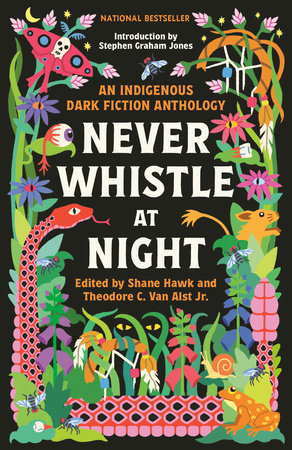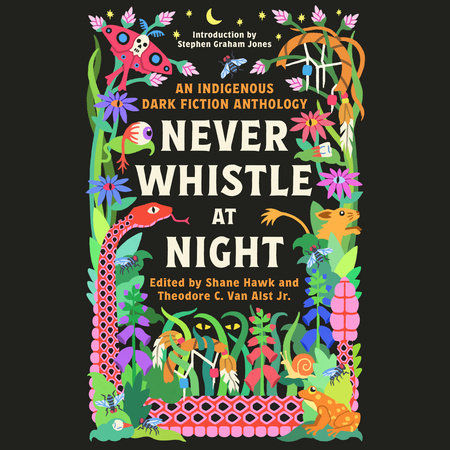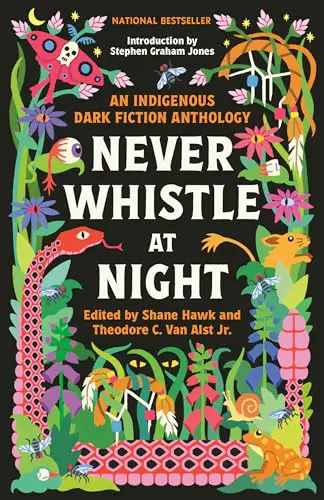Never Whistle at Night is an indigenous superstition that warns against whistling at night due to the belief that it can attract malevolent entities. This belief is commonly held in many indigenous cultures and is rooted in the fear of drawing harmful beings by whistling after dark.
The anthology “Never Whistle at Night” delves into indigenous folklore, horror fiction, and dark fantasy, offering a collection of haunting stories that explore the depths of colonial violence, generational trauma, and otherworldly creatures. This bold and sublimely sinister book challenges readers to confront unsettling themes and the monstrous side of humanity, particularly in its treatment of indigenous communities.
With its shiver-inducing tales of ghosts, curses, hauntings, and desperate deeds, the anthology invites readers into a world of darkness and mystery, where the boundaries between the natural and supernatural are blurred.
The Lore Of Silence After Dark
There is an ancient and mysterious belief that has transcended cultures and time, warning against the act of whistling at night. This intriguing myth, known as the “Never Whistle at Night” taboo, has fascinated people around the world and continues to spark curiosity and superstition. Let’s delve into the cultural origins of this myth and explore the global variations of the nighttime whistle taboo.
Cultural Origins Of The Myth
Throughout history, various cultures have attributed different meanings and consequences to whistling at night. In Native American traditions, for instance, this act is strictly forbidden due to the presence of shape-shifting entities known as “Skinwalkers” or “Stekinis.” These malevolent beings are believed to be attracted to the sound of whistling, causing harm to those who encounter them.
Similarly, in other indigenous cultures, the belief in the dangers of nighttime whistling runs deep. Whistling is seen as a way to attract spirits or invite misfortune into one’s life. The silence of the night is considered sacred, and disrupting it with a whistle is seen as a disrespectful act that can result in negative consequences.
Global Variations Of The Nighttime Whistle Taboo
The “Never Whistle at Night” myth is not limited to indigenous cultures alone. It has found its way into various other cultural beliefs and superstitions worldwide. In some European countries, for example, whistling at night is believed to summon evil spirits or bring bad luck.
In Asian cultures, the taboo against whistling at night is also prevalent. In Japan, it is believed that whistling at night can attract snakes or cause them to appear. Similarly, in some parts of China, whistling at night is associated with inviting ghosts or spirits into one’s surroundings.
These variations in the nighttime whistle taboo highlight the universal human fascination with the unknown and the desire to protect oneself from potential harm. Whether rooted in ancient folklore or shaped by more recent cultural beliefs, the cautionary tale of never whistling at night serves as a reminder to respect the mysteries of the dark and embrace silence after dusk.
So, the next time you find yourself under the starry sky, remember the lore of silence after dark and resist the temptation to break the stillness with a whistle. Who knows what unseen forces might be listening?

Credit: www.penguinrandomhouse.com
The Whistle In The Wind
Beware the ancient warning to never whistle at night, as it may beckon malevolent entities from the shadows. In “The Whistle in the Wind,” a chilling tale unfolds as darkness descends, stirring up eerie consequences under the cloak of night.
Psychological Impact Of Eerie Sounds
The human mind is a complex and fascinating entity, susceptible to various stimuli that can trigger powerful emotions and reactions. One such stimulus is the eerie sound of a whistle in the wind, which has been known to have a profound psychological impact on individuals. The chilling nature of this sound can evoke feelings of fear, anxiety, and unease, tapping into our primal instincts and triggering a fight-or-flight response. The psychological impact of eerie sounds like the whistle in the wind can linger long after the sound has ceased, leaving individuals with a lingering sense of uneasiness and a heightened awareness of their surroundings.
The Power Of Sound In Folklore
Sounds play a significant role in folklore and have the power to shape narratives, evoke emotions, and create a sense of atmosphere. Throughout history, cultures around the world have attributed mystical and supernatural qualities to certain sounds, including the eerie whistle in the wind. In folklore, this sound is often associated with ominous omens, malevolent spirits, or even warnings of impending danger.
The power of sound in folklore lies in its ability to transcend language and communicate on a primal level. It taps into our deepest fears and superstitions, weaving a web of mystery and intrigue. The whistle in the wind, with its haunting and ethereal quality, becomes a symbol of the unknown, evoking a sense of awe and curiosity in those who encounter it.
In Native American traditions, the belief that whistling at night can attract malevolent entities, such as Skinwalkers or Stekinis, is deeply rooted. This superstition serves as a cautionary tale, warning individuals of the potential dangers that lurk in the darkness. It is a testament to the power of sound in shaping cultural beliefs and practices.
Whether it is the eerie whistle in the wind or other haunting sounds, the power of sound in folklore cannot be underestimated. It has the ability to transport us to other realms, awaken our primal instincts, and leave a lasting impact on our psyche.
Entities Of The Night
Skinwalkers In Native American Culture
Within many indigenous traditions, the superstition of never whistling at night runs deep. This belief is rooted in the fear of drawing malevolent spirits, such as the infamous Skinwalkers. In Native American culture, Skinwalkers are considered to be powerful witches or sorcerers who have the ability to shapeshift into animals. It is believed that they are capable of causing harm to those who encounter them, and therefore, whistling at night is forbidden to avoid attracting these malevolent entities.
Stekinis In Native American Culture
Another malevolent entity present in Native American folklore is the Stekini. Similar to the Skinwalkers, the Stekini is associated with shape-shifting and is known to bring harm to those who cross its path. The belief in the existence of these entities serves as a cautionary warning, urging individuals to refrain from whistling at night to avoid attracting these sinister beings.
The Anthology Of Fear
Dive into “Never Whistle at Night” in “The Anthology of Fear,” a chilling collection delving into the taboo of night whistling. Uncover Indigenous beliefs and the sinister consequences that follow in this captivating and eerie exploration of darkness.
Exploring ‘never Whistle At Night’
As part of the anthology of fear, ‘Never Whistle at Night’ is a collection of indigenous dark fiction that explores themes of colonial violence and indigenous trauma. The title of the book itself refers to a belief common in many indigenous cultures that whistling at night can draw malevolent entities to you.
Themes Of Colonial Violence And Indigenous Trauma
The stories in ‘Never Whistle at Night’ delve into the horrors of colonial violence, generational trauma, and the ongoing struggles of indigenous communities. Through a mix of horror, mystery, folklore, dark fantasy, and paranormal fiction, the anthology paints a visceral and unflinching picture of the ongoing legacy of colonization.
‘Never Whistle at Night’ is just one part of the larger anthology of fear, a collection of horror fiction that dares to ask the question: “Are you ready to be un-settled?” By exploring the deepest fears and anxieties of readers, the anthology seeks to challenge and subvert traditional horror tropes, offering a fresh and unsettling take on the genre.
Whether you’re a fan of horror or just looking for a thought-provoking and spine-tingling read, ‘Never Whistle at Night’ is sure to leave a lasting impression. With its exploration of colonial violence, indigenous trauma, and the enduring power of folklore, it offers a powerful commentary on the ongoing struggles of indigenous communities while also delivering plenty of scares along the way.
Modern Interpretations
Discover the unsettling and sublimely sinister collection, “Never Whistle at Night: An Indigenous Dark Fiction Anthology. ” This thought-provoking book delves into the belief shared by many indigenous cultures that whistling at night can attract malevolent entities. Prepare to be captivated by these chilling tales of ghosts, curses, hauntings, and complex family legacies.
Literature’s Role In Preserving Myth
Indigenous cultures have passed down their beliefs and stories through oral tradition for generations. However, as time passes and societies evolve, these tales risk being forgotten. Literature plays an essential role in preserving these myths and ensuring they remain relevant to modern audiences. The anthology “Never Whistle at Night” by Shane Hawk is an example of how literature can preserve and elevate Indigenous myths and beliefs.
Horror And Its Reflection Of Societal Issues
Horror, as a genre, often reflects societal issues and fears. “Never Whistle at Night” explores themes of colonization, generational trauma, and the struggles of Indigenous people. The horror elements in the stories serve as metaphors for the real-life horrors that Indigenous communities have faced and continue to face. The anthology provides a platform for Indigenous voices to be heard and for their stories to be told in a way that resonates with a wider audience.
In conclusion, “Never Whistle at Night” is an essential read for anyone interested in horror, Indigenous literature, and preserving myth. The anthology serves as a powerful reminder of the importance of literature in preserving cultural heritage and elevating marginalized voices.

Credit: www.penguinrandomhouse.com
Tales Of Caution And Consequence
Dive into the chilling anthology “Never Whistle at Night,” featuring Indigenous folklore. Explore the forbidden act of night whistling, believed to attract malevolent entities in various indigenous cultures. These haunting tales reveal the consequences of defying this cautionary tradition.
The Moral Lessons In Dark Fiction
Dark fiction has always been a means of storytelling that provides moral lessons. The Indigenous Dark Fiction Anthology, Never Whistle at Night, is no exception. This collection of stories explores the horror that lives in colonial violence, generational love and trauma, and the supernatural. Each story is a cautionary tale that reminds us of the consequences of our actions.
Storytelling As A Means Of Cultural Expression
For Indigenous cultures, storytelling is a means of cultural expression. It is a way of passing down traditions and beliefs from generation to generation. The stories in Never Whistle at Night are no different. They are steeped in the supernatural and folklore of Indigenous cultures. The anthology explores themes of identity, spirituality, and the importance of community. Through these stories, we get a glimpse into the rich cultural heritage of Indigenous peoples.
The Dangers Of Whistling At Night
One of the most intriguing aspects of Never Whistle at Night is the superstition that gives the anthology its title. Many Indigenous cultures believe that whistling at night can draw malevolent entities to you. The anthology explores this superstition through a variety of stories. Some of the stories feature shape-shifting entities known as Skinwalkers, while others explore the consequences of disturbing the spirits of the dead. Regardless of the specific entity, the message is clear – be careful what you do at night.
In conclusion, Never Whistle at Night is a fascinating anthology that provides a window into the supernatural and folklore of Indigenous cultures. Through its cautionary tales, the anthology reminds us of the consequences of our actions and the importance of community. So, the next time you are tempted to whistle at night, remember the tales of caution and consequence in Never Whistle at Night.
The Sound Of Superstition
Beware of whistling at night, as many indigenous cultures believe it can attract malevolent entities. This superstition is rooted in the fear of drawing the attention of shape-shifting creatures like Skinwalkers, leading to potential harm for those who encounter them.
Why Some Superstitions Persist
Superstitions are beliefs or practices that are not based on science or reason, but rather on tradition or folklore. Despite their lack of scientific backing, many people still hold on to superstitions and pass them down from generation to generation. One reason for this is that some superstitions have been around for centuries and are deeply ingrained in cultural beliefs. Additionally, superstitions often serve as a way to cope with uncertainty and anxiety, providing people with a sense of control over their lives.
The Psychological Basis For Supernatural Beliefs
Belief in the supernatural, including superstitions, has been linked to various psychological factors. One of these is the need for control. When people feel uncertain or anxious, they may turn to superstitions as a way to feel like they have some control over their environment. Another psychological factor is the tendency to find patterns and meaning in random events. This can lead people to attribute supernatural causes to events that are actually just coincidence or chance. Additionally, people may be more likely to believe in supernatural phenomena if they have had personal experiences that they cannot explain through rational means.
Overall, superstitions like the belief that one should never whistle at night persist due to their cultural significance and the psychological factors that contribute to belief in the supernatural. While there may not be any scientific evidence to support these beliefs, they continue to hold a powerful sway over many people’s lives.

Credit: www.amazon.com
Behind The Whistle
Never Whistle at Night, an Indigenous Dark Fiction Anthology, is a captivating collection that delves deep into the mystical and haunting world of indigenous folklore. The stories within this anthology are rich with cultural significance and offer a unique perspective on the supernatural.
Personal Accounts And Story Reviews
The personal accounts and story reviews of Never Whistle at Night provide a glimpse into the spine-chilling experiences and thought-provoking narratives within the anthology. Readers are drawn into a world where the line between reality and the supernatural is blurred, leaving them with a sense of unease and fascination.
The Narrative Power Of Indigenous Voices
The narrative power of indigenous voices in Never Whistle at Night is a testament to the rich storytelling tradition of indigenous cultures. Through these stories, readers gain insight into the beliefs, fears, and experiences of indigenous communities, bringing to light the enduring power of their oral traditions.
Frequently Asked Questions
Why Do Native Americans Say Not To Whistle At Night?
Native Americans say not to whistle at night due to the belief in shape-shifting entities called “Skinwalkers” or “Stekini” that can cause harm.
What Is The Meaning Of Never Whistle At Night?
Whistling at night is believed to attract malevolent entities in many indigenous cultures. This superstition stems from the fear of encountering shape-shifting entities like Skinwalkers.
How Scary Is Never Whistle At Night?
Never Whistle at Night is a collection of Indigenous dark fiction stories. Whistling at night is believed to attract malevolent entities in many indigenous cultures. The anthology explores themes of horror, colonial violence, and generational trauma. It evokes visceral emotions and highlights the monstrous treatment of the Indigenous community.
Faq 1: Why Do Native Americans Say Not To Whistle At Night?
Native Americans believe that whistling at night can attract a shape-shifting entity known as a “Skinwalker” or “Stekini,” which can cause harm to those who encounter it.
Faq 2: What Is The Meaning Of Never Whistle At Night?
The title of the anthology “Never Whistle at Night” refers to the common belief in many indigenous cultures that whistling at night can draw malevolent entities towards you.
Conclusion
The anthology “Never Whistle at Night” delves into the chilling world of indigenous folklore and superstitions, weaving tales of malevolent entities and shape-shifters. These haunting stories serve as a stark reminder of the deep-rooted beliefs and traditions within indigenous cultures, captivating readers with their eerie and thought-provoking narratives.

